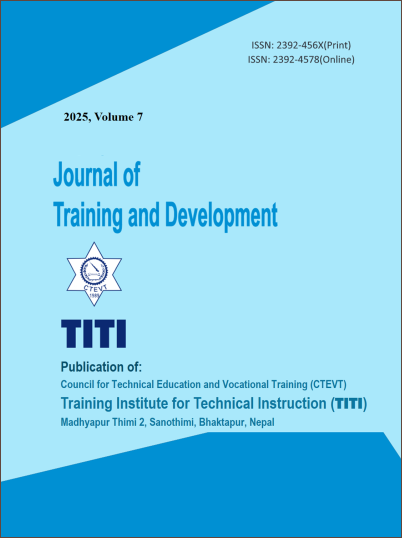Technical Education in Community Schools (TECS) Instructors’ Experience in their Retention: A Narrative Study
DOI:
https://doi.org/10.3126/jtd.v7i1.74982Keywords:
Job Security, Professional Development, Retention, TECS Instructors, Working EnvironmentAbstract
This empirical paper aims to explore the Technical Education in Community Schools (TECS) instructors’ experiences in their retention. Three TECS instructors from the Kathmandu valley were purposively interviewed to extract their in-depth information. A narrative inquiry method was used to explore the research participants’ lived experiences about their teaching profession along with the various aspects of their retention. Herzberg's motivation-hygiene factor theory was adopted to overview the instructors’ retention at TECS. The study revealed that retention of the instructors is a matter of personal and professional concern. Due to low pay and no provision for job security, those instructors who were only involved in teaching were not satisfied. On the other hand, instructors were happy with their teaching professions as they were applying theoretical knowledge to their practical fields. A flexible working environment, a bureaucratic hurdles-free system, an updated curriculum with appropriate tools and equipment, and professional development opportunities are to be considered for the instructors’ retention at TECS. In a nutshell, TECS instructors’ retention is contextual and depends on working conditions, financial benefits, job security, and professional development opportunities.
Downloads
Downloads
Published
How to Cite
Issue
Section
License

This work is licensed under a Creative Commons Attribution 4.0 International License.
Authors who publish with this journal agree to the following terms:
- Authors retain copyright and grant the journal right of first publication with the work simultaneously licensed under a Creative Commons Attribution License that allows others to share the work with an acknowledgement of the work's authorship and initial publication in this journal.
- Authors are able to enter into separate, additional contractual arrangements for the non-exclusive distribution of the journal's published version of the work (e.g., post it to an institutional repository or publish it in a book), with an acknowledgement of its initial publication in this journal.
- Authors are permitted and encouraged to post their work online (e.g., in institutional repositories or on their website) prior to and during the submission process, as it can lead to productive exchanges, as well as earlier and greater citation of published work (See The Effect of Open Access).




